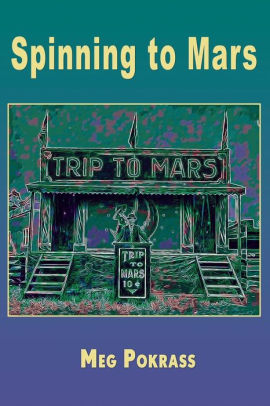The Act of Remembering: A Review of ‘Spinning to Mars’ by Meg Pokrass
By Allison Wall
Posted on

Spinning to Mars by Meg Pokrass (Blue Light Press, June 2021) is an introspective collection of linked micro-fiction. For those who might be unfamiliar with this form, micro-fiction is an even more abbreviated style of storytelling than flash fiction, though micro still technically falls under flash’s umbrella. Pokrass is an award-winning expert of the genre, and reading this collection highlights the form’s charms, strengths, and possibilities.
The inciting incident of the book as a whole is the loss of the protagonist’s father when she is five years old. The feeling of his absence permeates the sequence. It is as though he is on another planet, unreachable and alien. The fatherless protagonist grows up spinning (sometimes sure of what she wants, other times disoriented and confused). Always, though, she carries with her a profound sense of solitude in spite of the presence of her mother, boyfriends, husbands, lovers, children, and cats.
Most of the individually titled micros in Spinning to Mars are less than half a page long. The reader may feel an impulse to rush through them, but I’d encourage against it. These micros are like the narrative cousin of haiku: they are most impactful when, rather than reading ten in a row, the reader slows down and contemplates the effect of one sentence, one word, exactly where it is in relation to the rest of the words on the page. Each is equally important, carefully chosen, and placed with intention. Each holds the weight of a pebble dropped into a still lake.
I might also compare this collection to a mosaic since its many fragments, each beautiful on its own, construct something larger than the sum of its parts. One of the most striking images in the collection is that of an insect preserved in amber; I borrow this as a metaphor for the book. Pokrass has assembled many moments and feelings, and they are here, preserved, each on their own page. It is up to the reader to put them in a line mentally and order them (or maybe, instead, to simply sit back and feel their cumulative effect).
The micros switch between third and second-person points of view, and they skip around in time. The fears of youth—“you were never afraid of hell. Only of being a girl in a house full of so many turned-off lights”—mingle with the regrets of adulthood. At the heart of the collection is “Weather,” a micro in first person that’s ostensibly written to be a one-sided conversation (like we are listening to someone talk on the phone). Here, the speaker is presumably talking about “bad weather,” but the subject deepens, and they say, “We do get used to our lives, whatever they are. Well, not really, I mean it is impossible not to wish for something better.” The piece “Movies” sharpens this insight, as the protagonist cries while watching films, and Pokrass reflects: “To cry at all, in a movie, is scrunching up in the corner of your life and seeing what is sad, or good, but wrong, or what could have been.”
Spinning to Mars captures the struggle to navigate the complexities of human relationships and find fulfillment in life. Bittersweet longing gives way to humor, to horror, to beauty, to awkwardness, and to loss. Reading these micros feels like the act of remembering. They relate and interlock, but are scattered: out of chronological sequence, in different points of view. They influence each other and me, the reader/rememberer, but in a layered, complex way that I am not fully aware of until I stop and reflect.
So, too, do the experiences we gather by living accumulate in fragments, memories—insects in amber—frozen outside of time in our minds. It is up to each of us what we do with these memories and what meaning we may find in them, but we first have to remember.
– Allison Wall